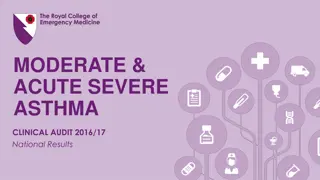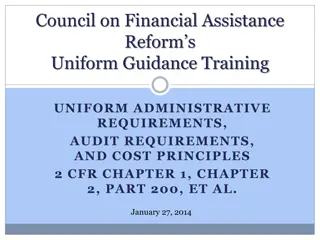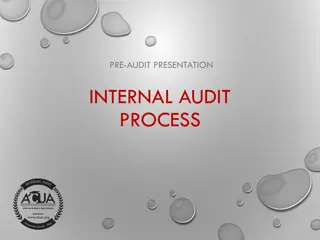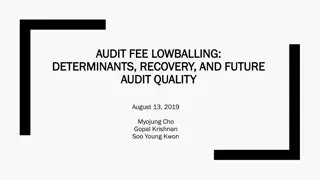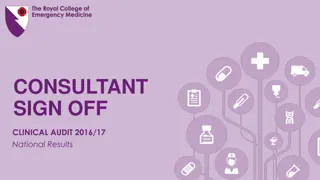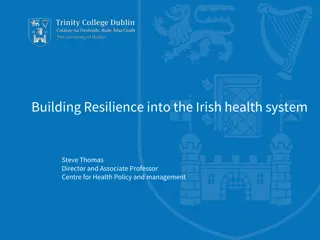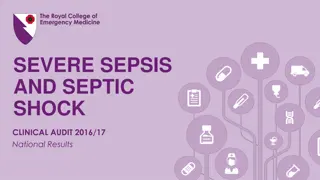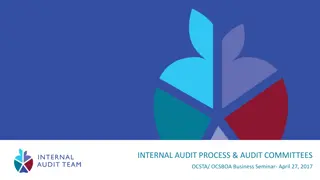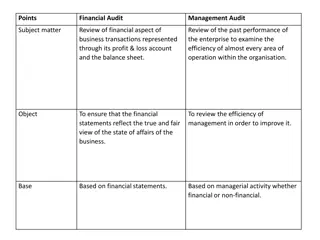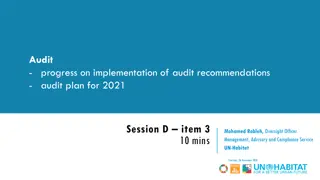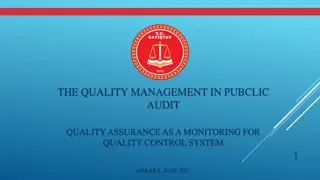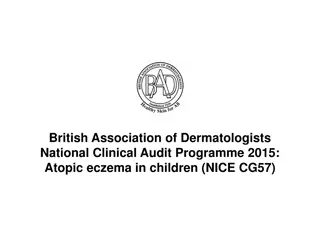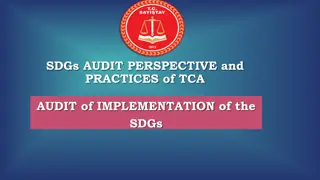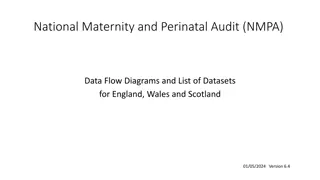Jamaica's National Public Health System Resilience Audit Report
Jamaica's institutional framework for public health system resilience was assessed in a performance audit report. The audit focused on evaluating the country's capacity to ensure resilience in the public health system and progress in building a strong and resilient healthcare system. Key areas of focus included policies, national frameworks, implementation, monitoring, and infrastructure capacity. The report found that while Jamaica has established a legislative structure and policy frameworks, there are gaps in accessing updated operational plans and documenting lessons learned from health emergencies.
Download Presentation

Please find below an Image/Link to download the presentation.
The content on the website is provided AS IS for your information and personal use only. It may not be sold, licensed, or shared on other websites without obtaining consent from the author. Download presentation by click this link. If you encounter any issues during the download, it is possible that the publisher has removed the file from their server.
E N D
Presentation Transcript
Effectiveness of Jamaicas Institutional Framework in Enabling a Strong and Resilient National Public Health System Performance Audit Report 2023 March 14
UNDERSTANDING HEALTH SYSTEMS RESILIENCE The ability of countries to mitigate, prepare, respond and recover from disruptive events with public health implications, while maintaining the provision of essential functions and services and using experiences to adapt and transform the system for improvement . World Health Organisation (WHO) definition
3 AUDIT OBJECTIVE Given the threats of public health emergencies on the country s health security, the overall objective of the audit is to assess: The adequacy of Jamaica's institutional capacity to ensure the resilience of the public health system. The extent to which Jamaica's institutional framework is progressing to building a strong and resilient public health system.
KEY AUDIT FOCUS KEY AUDIT FOCUS Policies and plans at the sub-national level to foster integration for health system resilience National frameworks and regulations supporting health systems resilience Policy & Plan Framework Implementati on and Operational level Monitoring & evaluation Infrastructure and infostructure capacity to support health system resilience Promoting health system resilience in monitoring and evaluation WHO health systems resilience toolkit
NATIONAL FRAMEWORK The Government established a legislative structure for public health and has set the foundation to build a resilient public health system by outlining the policy framework, in the Vision 2030 National Development Plan (NDP), to strengthen the healthcare system.
NATIONAL FRAMEWORK Legal and policy frameworks in place to build a resilient public health system. Vision 2030 NDP incorporates Jamaica s public healthcare policy framework. Range of emergency operational plans, policies, protocols, and manuals are in place to respond to various diseases. No repository where public healthcare administrators can access updated versions of operational policies, protocols, and manuals. Absence of assessment and documentation of lessons learnt from health emergencies.
INFRASTRUCTURE CAPACITY Hospital bed capacity and doctor/nurse-to- population densities impacting the resilience of the public health system. Analysis of PAHO s data shows that Jamaica had 1.68 hospital beds available for every 1,000 persons in the population in 2021. Jamaica s density ratio of 2.71 doctors and nurses per 1,000 population is below the minimum density ratio of 4.45 skilled health worker recommended by the WHO.
INFRASTRUCTURE INFRASTRUCTURE CAPACITY CAPACITY Health system strengthening programme to improve health facilities impacted by delays in implementation and funding gaps. Health facilities are working in silos due to the absence of an integrated information system to facilitate the sharing of critical information such as patients records. Slow implementation of actions to improve healthcare service to the vulnerable in emergencies.
INFRASTRUCTURE CAPACITY Administrative weaknesses in how MoHW and RHA s handled the maintenance of public health facilities, medical equipment and patients complaints, which are critical to the effective delivery of healthcare services. Poor planning for preventative and corrective maintenance of health facilities and medical equipment. Absence of a coordinated approach for the effective management of patient complaints.
HEALTH FINANCING STRATEGY Although the Government allocated $359 billion between 2016-17 and 2020-21 to fund public health, resource gap remains a challenge. Jamaica health expenditure to GDP ratio over the period 2015-2019 is 2.18 percentage point below PAHO recommended benchmark of six percent. Jamaica health financing strategy needs strengthening taking into consideration the guidance provided by the WHO on health financing strategies in building health systems resilience.
CONCLUSION CONCLUSION Jamaica s progress towards strengthening its public health system has been slow, exacerbated by the Covid-19 pandemic. Hence, more needs to be done if the country is to achieve the NDP health-related targets to improve the resilience of the public health system by year 2030.
WHAT SHOULD BE DONE Better coordination and resource planning using a Whole-of-Government Approach (WGA) Better coordination is urgently required among key stakeholders, particularly MoHW and MoFPS, to implement the health-related actions under Vision 2030 NDP to build the capacity and the resilience of the public health system and to achieve the targets by year 2030.
WHAT SHOULD BE DONE WHAT SHOULD BE DONE 14 Learning from experience to adapt and improve MoHW should incorporate post- event reviews to aid in its response and recovery efforts by properly documenting and analysing lessons learnt from health emergencies and use the information to adapt and transform the public health system.
WHAT SHOULD BE DONE Address administrative weaknesses There is an urgent requirement for MoHW and RHAs to fix the administrative weaknesses identified in the handling of preventative and corrective maintenance of public health facilities and medical equipment and managing patients complaints, which are critical to the effective delivery of healthcare services.




